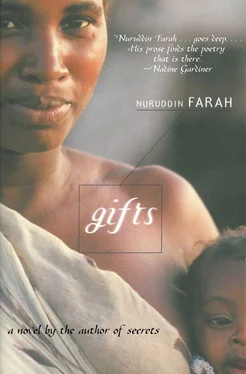Nuruddin Farah - Gifts
Здесь есть возможность читать онлайн «Nuruddin Farah - Gifts» весь текст электронной книги совершенно бесплатно (целиком полную версию без сокращений). В некоторых случаях можно слушать аудио, скачать через торрент в формате fb2 и присутствует краткое содержание. Год выпуска: 2011, Издательство: Arcade Publishing, Жанр: Современная проза, на английском языке. Описание произведения, (предисловие) а так же отзывы посетителей доступны на портале библиотеки ЛибКат.
- Название:Gifts
- Автор:
- Издательство:Arcade Publishing
- Жанр:
- Год:2011
- ISBN:нет данных
- Рейтинг книги:3 / 5. Голосов: 1
-
Избранное:Добавить в избранное
- Отзывы:
-
Ваша оценка:
- 60
- 1
- 2
- 3
- 4
- 5
Gifts: краткое содержание, описание и аннотация
Предлагаем к чтению аннотацию, описание, краткое содержание или предисловие (зависит от того, что написал сам автор книги «Gifts»). Если вы не нашли необходимую информацию о книге — напишите в комментариях, мы постараемся отыскать её.
Gifts — читать онлайн бесплатно полную книгу (весь текст) целиком
Ниже представлен текст книги, разбитый по страницам. Система сохранения места последней прочитанной страницы, позволяет с удобством читать онлайн бесплатно книгу «Gifts», без необходимости каждый раз заново искать на чём Вы остановились. Поставьте закладку, и сможете в любой момент перейти на страницу, на которой закончили чтение.
Интервал:
Закладка:
She had neglected her own body while she took care of others’ physical needs, as a nurse, as mother of three children, and now as co-guardian of a foundling. She hadn’t realized she had grown so fat that she had a belt of it round her waist.
Somali men are said to be turned on by the mound of flesh round a woman’s navel. But what kind of women did Bosaaso like? Did he prefer them slim, young-bodied, with not an extra ounce anywhere? For a woman of her age and background, Duniya knew her body was still in good shape. Surely, she thought, it wasn’t a body to turn up one’s nose at. It had served her faithfully all these years, giving of itself all it possibly could, and it had known only two men, one of them sixty-odd years old. In the two years she had been Zubair’s wife, they could not have made love more than thrice a month. Yet she had not felt sexually dissatisfied; most traditional couples did not make love often, and no one made such a big deal about sex anyway.
Her second husband Taariq wanted it nightly Nor did the calendar of her period deter him from demanding that she oblige. However his stamina was short-lived and he came at the very point when she started to climb the ladder of her own sexual pleasure. When he was drunk, she would push him away like an infant breast-feeding playfully He would without a fuss fall asleep, snoring instantly so she would have to shake him awake in order to have a quiet night.
By leaps of logic she found herself considering the women Bosaaso had known, who might have left indelible influences on him. His mother. The Afro-American with whom he had cohabited for several years. And Yussur. Duniya made a mental note to find out as much as she could about these women, not as rivals, just as people. Would Nasiiba know anything about the Afro-American, Nasiiba who knew such things?
Getting into a dress belonging to what Duniya referred to as one of Nasiiba’s moods (Nasiiba had the expensive habit of buying clothes she never wore, dresses bought when they took her fancy and which she then forgot), she now felt let down by her own weakness. Why, she had never thought the day would come when she, Duniya, would rack her brain about male likes and dislikes or would dress to please a man! She was being silly falling in love and admitting it; stupid borrowing a dress of Nasiiba’s when the one she had worn the night before had made her feel so uncomfortable, tight at the waist, itchy and moist at the armpits.
Someone was knocking on the door. Urgently.
“Who is it?”
“Open the door, Mummy.”
“What is it?”
“Open and I’ll tell you.” Nasiiba was breathless as though all the jinns in the cosmos had formed themselves into a union to chase her to this door.
“What is it, Naasi? Tell me,” Duniya said, opening the door.
“It’s about the baby.”
For a moment Duniya couldn’t think whom she meant. “What baby?”
“The foundling.”
“What about him?”
And Duniya remembered the name of the young woman whom she had seen at the Out-patient Clinic — Number Seventeen. Fariida was the girl’s name. Sister to the Somali Airlines stewardess whom Yarey had wanted to contact so she would take a letter to Abshir. Heavens, what complications!
Duniya told her daughter to calm herself, “Whatever it is you have to say, remember the universe is two hundred million years old and won’t come to an end before you’ve spoken your piece. Now what’s bothering you?”
“Muraayo is here,” said Nasiiba, chest palpitating with anxiety.
Duniya was not moved by this news. She turned, asking Nasiiba to zip up the back of her dress. This done, Duniya walked over to the standing-mirror to take an appreciative look at herself. She was amazed she had accomplished all this without tripping or knocking things over in clumsy gestures of lost equilibrium. Then: “Now why should Muraayo’s being here frighten you so?”
“It’s about the foundling.”
Duniya calmed herself down. “What about the foundling?”
“Promise you won’t give away the foundling to Muraayo?”
Duniya decided that Yarey had been naughty and had threatened not to return to Muraayo’s household but to stay here where, because of Bosaaso and the baby a lot of late-night fun was taking place, more than at Uncle Qaasim’s. “Why shouldn’t we give the foundling to Muraayo?” she said to Nasiiba.
“He’s not meant for them,” Nasiiba said.
“I may not be the most intelligent woman in the world, but I’m not that stupid and none of what you’ve said so far makes any sense to me.” Duniya paused. “Tell me, when did you last see Fariida?”
Nasiiba acted strangely, looking about suspiciously as though Fariida were hiding in the shadows of the darkened room. Then she swallowed hard, and her eyes popped as if she had by mistake eaten her own Adam’s apple. She recovered quickly enough to say in her characteristically defiant way, “What has Fariida got to do with what we’re talking about?”
“You’re the one who found the baby,” said Duniya. “Not me.”
Duniya could sense because of Nasiiba’s stillness of breath she had hit a target. But the feeling lasted only briefly. What made her feel triumphant was that it was Nasiiba who knocked her great toe on Mataan’s doorsill, not Duniya.
“Tell Aunt Muraayo I’ll be with her in a moment,” said Duniya.
Fariida: the mother of the foundling? Who was the father then?
Muraayo gave Duniya a light kiss on the cheeks and a cursory embrace. She was a huge woman, standing five foot nine and nearly twice as wide as Nasiiba. Her bare arms were of the enormous size that filled the sex-starved fantasies of some Somali men. She had very shiny, dark skin, and frequently went to her favourite coiffeuse to have her hair done in different styles, wearing it uncovered. She called at the tailor’s just as often, never failing to bring him fashion magazines from which to copy, in the belief that her dresses resembled no one else’s in Mogadiscio. With equal enthusiasm and panache, Muraayo visited silversmiths and goldsmiths with whom she haggled relentlessly so she would receive favourable trade-ins for her wares. Muraayo’s build was such that people stepped aside, willing to surrender to her as much space as she wished to take. What was more, people simply couldn’t help obeying her commands.
The twins did not like it that she treated them as though they were infants. Mataan, with unusual frankness, had once said, “Aunt Muraayo pampers her huge body with an overdose of self-adulation.” In Nasiiba’s opinion “to think of Muraayo is to recall fiery moods and self-indulgence.” Duniya concurred with both her children, adding that Muraayo was a woman to have as a friend, not an enemy.
Duniya and the twins had known her in the days when she had been slim, just married to Qaasim, Taariq’s elder brother. A life-force, that was how Duniya described her then. Muraayo had emanated womanhood. When a number of years went by without her being blessed with a pregnancy, this did not bother or sadden the couple. She was supposed to have said that her husband Qaasim had as many children as he was likely to want. “What I give him is what his former wives never offered him: life and love.” No one doubted her word. It was also a known fact that the walls of their house cracked with the primeval screams of their love-making, thereby giving birth to the gossip that one of her neighbours described the whole thing as a fake show, meaning that Muraayo wasn’t enjoying love-making but acting. Some of these women wondered if she was not infibulated.
Some of the men thought of Qaasim as a cuckold; for it was said that Muraayo had the habit of entertaining male visitors in the wing of the house furthest from the main entrance and in which their bedrooms were, when her husband was not at home.
Читать дальшеИнтервал:
Закладка:
Похожие книги на «Gifts»
Представляем Вашему вниманию похожие книги на «Gifts» списком для выбора. Мы отобрали схожую по названию и смыслу литературу в надежде предоставить читателям больше вариантов отыскать новые, интересные, ещё непрочитанные произведения.
Обсуждение, отзывы о книге «Gifts» и просто собственные мнения читателей. Оставьте ваши комментарии, напишите, что Вы думаете о произведении, его смысле или главных героях. Укажите что конкретно понравилось, а что нет, и почему Вы так считаете.











